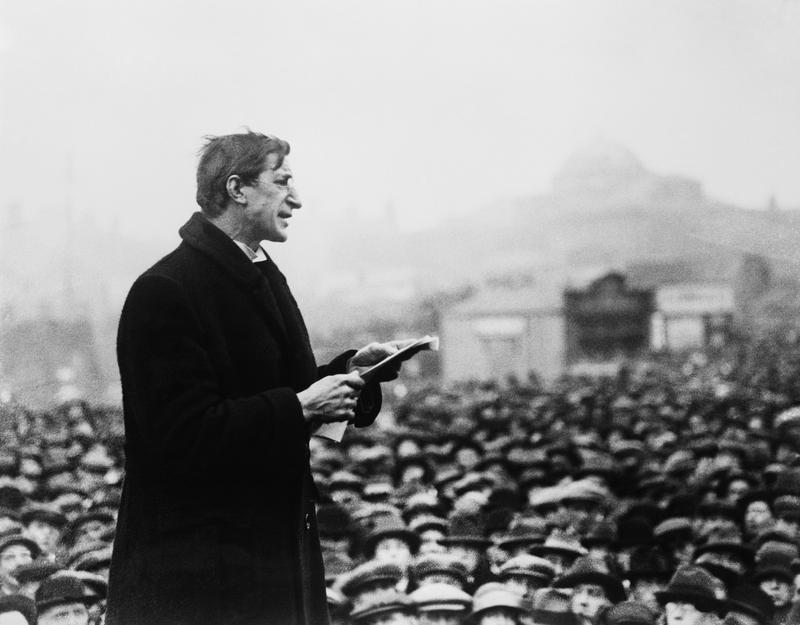"A Great Day for the Irish" as New York City Welcomes Eamon de Valera

The former prime minister and future president of Ireland, Eamon de Valera, is welcomed to New York by various dignitaries during this 1948 visit. Grover Whalen, the city's official greeter, introduces "the boy from Manhattan island" who now returns as a recognized world leader.
With Mayor William O'Dwyer too ill to attend, City Council President Vincent R. Impellitteri presents de Valera with a scroll. De Valera thanks all Americans for aiding the Irish in their struggle for independence and reminds them that the task is not yet complete. "No Irish man or Irish woman will be satisfied until the whole of that island is as free as the 26 Counties," he says.
This recording is a stirring reminder of how thoroughly Irish New York City used to be. After a playing of "The Star-Spangled Banner," Frank Ryan of the police department sings the Irish national anthem, "The Soldier's Song." This is followed by near pandemonium in the Council chamber. Whalen comments on the reception the motorcade received in all parts of the city as they traveled downtown. Impellitteri, apologizing for the mayor's absence, points out the coincidence, that while de Valera was born in Manhattan, O'Dwyer was born in County Mayo. De Valera professes to be overcome with emotion. He emphasizes the strong ties between the two countries and then concludes his speech in Gaelic…until he is drowned out by thunderous applause. O'Dwyer, who has been listening from Gracie Mansion, calls to confer honorary citizenship on de Valera. The police department glee club then sings a medley of songs, ending with, "It's a Great Day for the Irish."
Eamon de Valera was born in New York City in 1882 and was raised in Ireland. A committed Republican, he participated in the 1916 Easter Uprising, an abortive rebellion that was quickly crushed by the British. Although he was jailed along with the other leaders, a set of unique circumstances led to de Valera avoiding execution. As The New York Times reported:
The major reason for his salvation was probably public opinion: the people in Britain as well as Ireland were becoming sickened by daily news of further executions. Most commentators would agree, however, that his dual citizenship helped spare his life. His wife had gone to the U.S. consul in Dublin even before his court-martial to argue his rights as an American citizen, and the consul got in touch with British officials.
The result of surviving this "purge" was that de Valera rose quickly in what remained of the Republican leadership, becoming the head of Sinn Fein. His ties to the United States proved useful as he was able to raise money there to finance the cause back home. His complex (some say shifty) negotiations with the British over the fate of Ireland led him to publicly reject the unpopular Anglo-Irish Treaty that led to the country's partition despite the fact that it had been ratified by his own representatives. After the ensuing Civil War, he grudgingly accepted de facto partition, in the short term, and concentrated on establishing the Irish Free State as a stable republic. Breaking with Sinn Fein, he established the Fianna Fail Party, which was to dominate Irish politics for decades to come. The University College of Dublin website describes how:
Fianna Fail's election victory in 1932 marked the beginning of 16 years in power during which de Valera was both prime minister and minister for external affairs. Policies of promoting small-scale tillage farming and industrial development behind high tariff walls, reinforced by the Economic War, reflected the traditional nationalist goal of economic self-sufficiency. On the political front, de Valera saw off the threat from both the Blueshirts [Irish fascists] and the IRA and in 1937 his new constitution was enacted. In foreign affairs de Valera achieved some notable successes. The Economic War was concluded in 1938 on very favorable terms and at the League of Nations de Valera was president of both the council and the assembly.
After World War II (in which Ireland remained neutral), Fianna Fail fell from power. Although nominally the leader of the opposition, de Valera took the opportunity to embark on a worldwide tour -- of which this was one stop -- promoting the unification of Ireland. His later career included several more stints as prime minister before he ascended to the largely ceremonial office of president after elections in 1959, when he was in his 70s.
Controversy still rages over de Valera's achievement in the formation of the Irish Republic. His close ties to the Catholic Church led, critics argue, to the enactment of social prohibitions and censorship that resulted in a backward, isolated culture. But there is no denying the enormous impact he had over the nation. The Oxford Dictionary of Political Biography concludes:
De Valera dominated post-independence Irish politics for 40 years. His Ireland was conservative, Catholic, and inward looking. His aim was to complete the task of creating the Republic proclaimed in 1916, drawing on its unique Gaelic, nationalist, and Catholic heritage. He succeeded up to a point, but at two prices. First, the conflict over the treaty led to civil war and a lasting legacy of bitterness; second, his policy of pursuing an end to partition was contradicted by his republicanization of the south, which widened the Irish gulf.
In contrast to the clichéd picture of the florid Irish speaker, de Valera, as heard here, is dry, not so much an orator as a meticulous, focused politician. At times inscrutable, castigated as untrustworthy by his opponents, he nevertheless inspired great loyalty and steered his nation on a remarkable course for a longer time and to much greater effect than almost any other leader of the 20th century.
De Valera died in 1975. He was 92.
Audio courtesy of the NYC Municipal Archives WNYC Collection.
